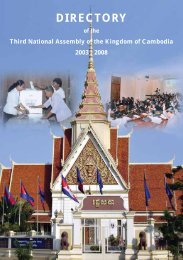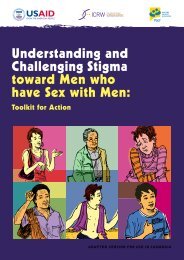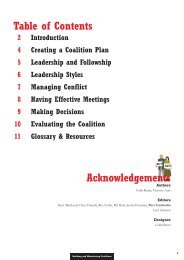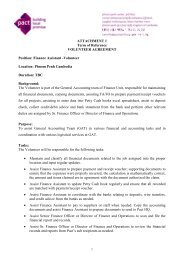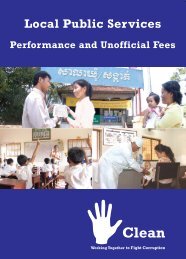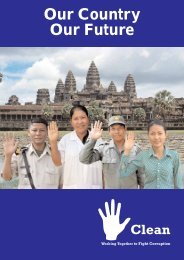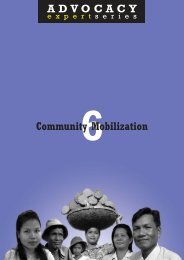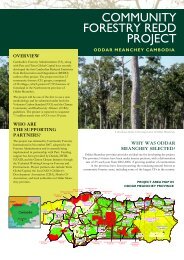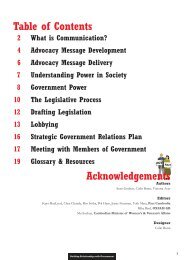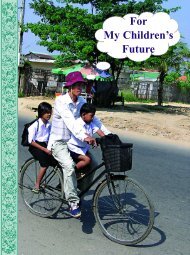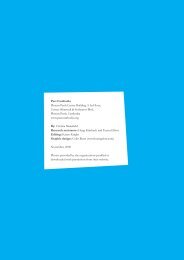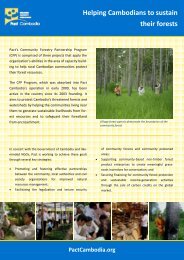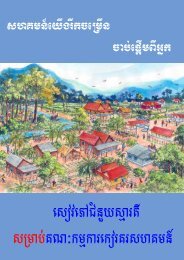Advocacy in Cambodia: Increasing Democratic ... - Pact Cambodia
Advocacy in Cambodia: Increasing Democratic ... - Pact Cambodia
Advocacy in Cambodia: Increasing Democratic ... - Pact Cambodia
Create successful ePaper yourself
Turn your PDF publications into a flip-book with our unique Google optimized e-Paper software.
land law<br />
Case Studies<br />
After the 1998 national elections,<br />
representatives of rural communities began<br />
flow<strong>in</strong>g <strong>in</strong>to Phnom Penh to protest land grabb<strong>in</strong>g<br />
(the act of privatiz<strong>in</strong>g community used land when<br />
ownership is unclear) <strong>in</strong> front of the National<br />
Assembly and the Prime M<strong>in</strong>ister’s residence.<br />
Land disputes began much earlier, but people had<br />
been reluctant to voice their grievances <strong>in</strong> previous<br />
years and prior to the elections. Once peace was<br />
established <strong>in</strong> December 1998, citizens began to<br />
feel <strong>in</strong>creas<strong>in</strong>g confidence to voice their concerns,<br />
and while the demonstrations<br />
did not lead to immediate<br />
action, they did serve to raise<br />
awareness of the land grabb<strong>in</strong>g<br />
problem and would eventually<br />
result <strong>in</strong> creation of national<br />
and prov<strong>in</strong>cial land dispute<br />
resolution commissions. The<br />
steady flow of demonstrators<br />
to the capital after the<br />
elections lent proof that the<br />
land grabb<strong>in</strong>g problem was<br />
extensive.<br />
Oxfam Great Brita<strong>in</strong>’s<br />
Land Study Project<br />
Oxfam GB, its partners, and other<br />
development organizations began hear<strong>in</strong>g stories<br />
from their project communities about land<br />
disputes and abuse of power and <strong>in</strong> August 1998,<br />
Oxfam GB, <strong>in</strong> collaboration with four local<br />
partners, <strong>in</strong>itiated a pilot Land Study Project (LSP)<br />
to study land disputes. The project began by<br />
look<strong>in</strong>g at causes of land disputes, and follow<strong>in</strong>g<br />
the research phase Oxfam held a workshop <strong>in</strong> late<br />
1998 for NGOs and government officials to discuss<br />
the study’s f<strong>in</strong>d<strong>in</strong>gs.<br />
The workshop concluded that the ma<strong>in</strong> cause<br />
of land disputes was shortcom<strong>in</strong>gs of the 1994<br />
Land Law, which some contend was created to<br />
serve the <strong>in</strong>terests of a small group. Some of the<br />
1994 Land Law clauses did not reflect the reality<br />
of the new market economy <strong>in</strong> <strong>Cambodia</strong>, <strong>in</strong> which<br />
land began to have more value. Under the 1994<br />
law, landowners were required to register at<br />
cadastral offices. This requirement was<br />
Legal Aid of <strong>Cambodia</strong><br />
conservatively estimates<br />
that 100,000 people are<br />
currently <strong>in</strong> a situation <strong>in</strong><br />
which powerful players are<br />
try<strong>in</strong>g to displace them.<br />
problematic and misunderstood, and most people,<br />
who considered themselves owners of land they<br />
were liv<strong>in</strong>g on did not try very hard to secure land<br />
titles. This failure to secure titles created<br />
opportunities for others to take advantage of the<br />
situation and grab land for themselves, sometimes<br />
by creat<strong>in</strong>g fake titles for properties and evict<strong>in</strong>g<br />
those liv<strong>in</strong>g on them.<br />
Enactment of a New Land Law<br />
When the Asian<br />
Development Bank began<br />
negotiat<strong>in</strong>g a large loan with<br />
the M<strong>in</strong>istry of Agriculture <strong>in</strong><br />
the mid-1990s, the land law<br />
issue arose and it became clear<br />
that a new land law was<br />
needed. Prior to 1995, the<br />
cadastral department fell<br />
under the M<strong>in</strong>istry of<br />
Agriculture’s responsibility. In<br />
1995, responsibility for that<br />
department was transferred to<br />
the Council of M<strong>in</strong>isters.<br />
In 1998, the cadastral<br />
department prepared a first<br />
draft of a new land law. At that<br />
same time, an outcome of the December 1998<br />
Oxfam GB workshop was the formation of an<br />
NGO/IO land law work<strong>in</strong>g group that met<br />
regularly to discuss the draft. The draft was divided<br />
<strong>in</strong>to six or seven sections (e.g. state property,<br />
<strong>in</strong>digenous rights, possession, concessions,<br />
succession) and various organizations accepted<br />
responsibility for analyz<strong>in</strong>g them. Oxfam GB<br />
provided a secretary to collect the comments.<br />
Dur<strong>in</strong>g the process, NGOs consulted with judges<br />
and officials from all levels of the M<strong>in</strong>istry of<br />
Justice <strong>in</strong> order to better understand what<br />
improvements were needed and to identify<br />
implications for implementation.<br />
In response to daily demonstrations by<br />
villagers <strong>in</strong> front of the National Assembly and the<br />
Senate, <strong>in</strong> March 1999 the Council of M<strong>in</strong>isters<br />
created a national land dispute commission with<br />
provisions for creation of prov<strong>in</strong>cial commissions.<br />
When communities demonstrated at the National<br />
54



